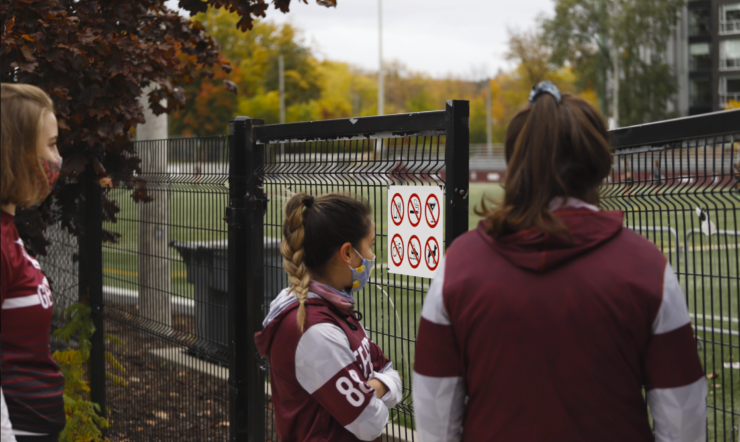Vaccines and masking are still effective!
For many COVID-19 is a memory of the past — it is something we dealt with in the 2020 lockdown and now life is back to normal. Well, that is certainly not the case, as COVID-19 still casts an omnipresent shadow over all of us. In Canada, COVID-19 cases have slowly been increasing this fall.
This is likely to do with the very limited COVID restrictions (such as social distancing and mask mandates) that are in place, not to mention the fact that the fall season is already a breeding ground for viruses, cold, and the flu.
Even though COVID-19 was declared to no longer be a global emergency, it is still something to be aware of and to care about. COVID-19 infections are still present. Anyone of any age, healthy or not, can develop long COVID, which are health complications that can develop after experiencing an infection. There are many symptoms of long COVID including, but not limited to, fatigue, shortness of breath, joint pain, muscle aches, issues with memory and heart palpitations.
Long COVID has also the possibility to lead to chronic conditions like migraines, chronic fatigue syndrome and autoimmune disorders. The scary part is that the research on long COVID is quite new, and researchers still don’t know much about how this condition impacts people in the long-term.
Disabled communities and people who are immunocompromised are often at a greater risk of developing complications from COVID-19. Some people don’t have a strong enough immune system to fight COVID-19. Having a disability or chronic condition makes it harder to deal with COVID-19. With the relaxed restrictions, many disabled people feel unsafe going out in public and interacting face-to-face. This has left disabled people feeling isolated because they cannot engage in the same level of social interaction as non-disabled people.
During the pandemic, there were also accommodating measures implemented to help most people struggling with the pandemic. There are things such as the ability to work from home, online meetings and online classes; many of these things are quite helpful and accommodate disabled people to this day, either to aid their disability or reduce their risk of COVID. For example, I have a chronic pain condition and I found online classes helpful on days where I was experiencing pain flare-ups.
Now that society has gone “back to normal”, these accommodations can be harder to get. There is a notion that people need to go back to how things were before COVID-19 — but this erases the fact that we cannot go back to how things were. Workers are still fighting for their right to work from home, and some students are left without things such as online lectures or recorded seminars. Removing these adaptive measures has made it difficult for disabled people to be integrated in society.
With COVID-19 cases increasing, it isn’t too late to take precautions in order to not get infected, infect others, and protect yourself and vulnerable people in our community. It is important to wear a mask, especially in crowded areas where infection can spread easier, and in health care settings such as hospitals. Make sure you pick out a mask with a decent filter.
If you have symptoms of COVID-19, make sure to use a rapid test. You can get rapid tests at your local pharmacy or Ottawa Public Health, although this may vary depending on where you are. There are resources that send rapid tests and high quality masks to Canadians for free.
If you test positive, it is important to self-isolate while you have symptoms. According to Ottawa Public Health, you can leave isolation 24 hours after your symptoms end, and 48 hours if you’ve experienced gastrointestinal symptoms.
Lastly, make sure to stay up to date with your COVID-19 vaccination and flu shot. You can register this fall to get vaccinated. Public Health Ontario provides a tool to search and find a pharmacy or location nearest you that is offering COVID-19 vaccinations.
COVID-19 is a serious illness that continues to harm society, especially the most vulnerable. It is important that we continue to care about the risk associated with the illness, and do our part to make sure we aren’t spreading this virus.
Additionally, I am not a doctor, I am simply a student. For more accurate information of how COVID-19 relates to you as an individual, I would suggest contacting a doctor or looking at Ottawa Public Health.






